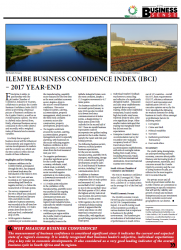Ilembe Business Confidence Index (IBCI) - 2017 Year-End2018-02-25 Enterprise iLembe, in partnership with the iLembe Chamber of Commerce, Industry & Tourism, collaborate to produce the iLembe Business Confidence Index (iBCI) aimed at providing a biannual picture of business confidence in the iLembe District, as well as an overall business outlook. The iBCI is a hybrid index derived from, firstly, a biannual business survey conducted in the iLembe district and secondly, with a weighted index of financial and economic variables.
It is likely that a region’s business mood will be influenced both positively and negatively by various developments in markets and the economy as a whole and the iBCI seeks to reflect the net results of these influences. Highlights and key findings
The SACCI Business Confidence Index (BCI) averaged 93.7 (base 2015 = 100) in the second half of 2017, a decline of 1.3 index points on the average 95.0 of the first half of 2017. World Economic Forum The World Economic Forum (WEF) has also recently published its 2017/18 Competitiveness Report. It is worth noting South Africa’s position according to various matters that is important to business in the global environment. The numbers give an indication of individual areas of performance in South Africa out of 137 countries - overall (61/137), basic requirements (92/137), efficiency enhancers (52/137) and innovation and sophistication (39/147). An executive opinion survey by the WEF identified the following six weakest elements for doing business in South Africa amongst 16 problematic factors (in declining order): 1. Corruption 2. Crime and theft 3. Political instability 4. Tax rates 5. Inefficient government bureaucracy 6. Poor work ethics In summary The credit rating downgrades, an underperforming national economy, concerns about public finances and increasing levels of unemployment, nationally, and concerns around the iLembe District’s economy and the cost of doing business locally, are reflected in the most negative iBCI recorded thus far. The private sector and all levels of government within the iLembe District are committed to partnering on specific initiatives that will aid the viability and growth of small and medium enterprises and secure investment in key economic sectors and geographies in our district. Enquiries: Nathi Nkomzwayo, CEO, Enterprise iLembe, nathi@enterpriseilembe.co.za Cobus Oelofse, CEO, iLembe Chamber of Commerce, ceo@ilembechamber.co.za Richard Downing, Economist, Econdow, econdow@axxess.co.za WHY MEASURE BUSINESS CONFIDENCE? The measurement of business confidence is considered significant since it indicates the current and expected state of a region’s economy. It is widely recognised that business leader’s subjective, individual expectations play a key role in economic developments. It also considered as a very good leading indicator of the overall business cycle in South Africa and its regions. |
Ilembe Business Confidence Index (IBCI) - 2017 Year-End
Copyright © 2024 KwaZulu-Natal Top Business
